30 对英语报中的语法质疑
专家老师好,在尝试读报的过程中,觉得有些句子存在语法错误,或者说值得商榷的地方。
又由于自己专业能力十分有限,不敢做最终的判定,有哪位有心帮助我的专家老师帮我分析一下,
对我的质疑之处做个判定。
内容以截图形式上传,共44张,不知是否能批量上传。
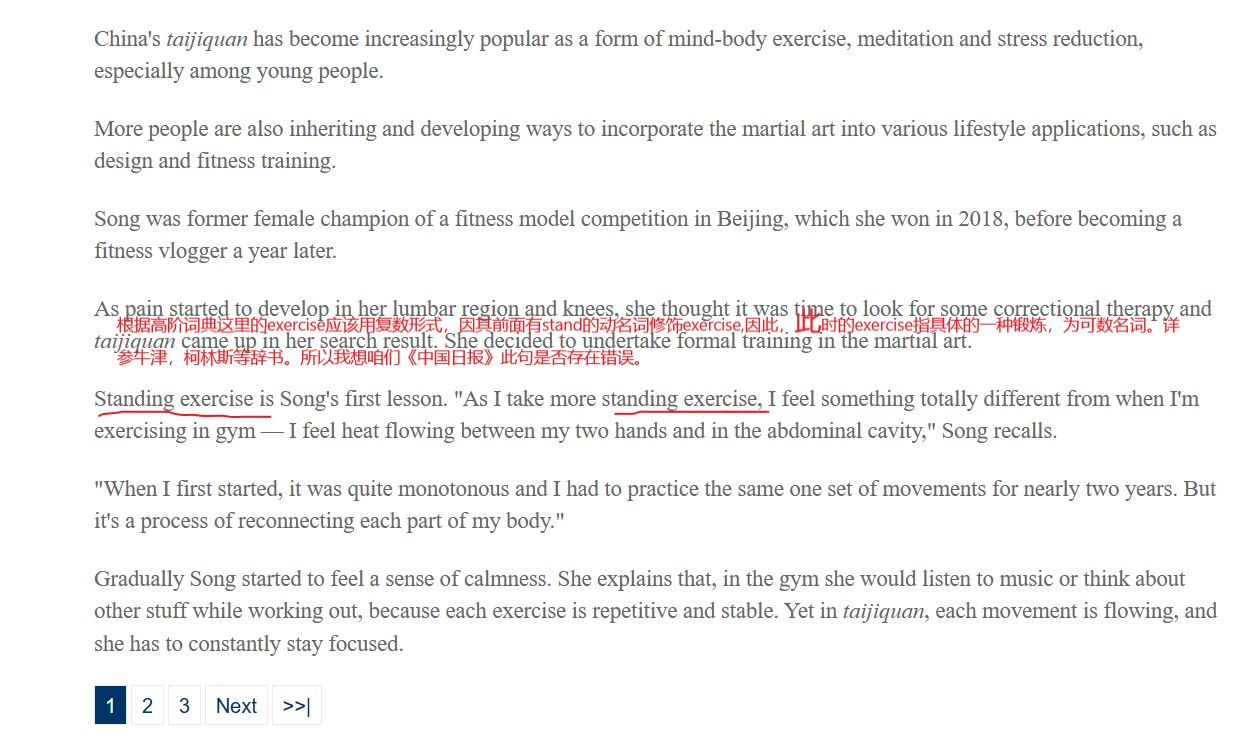
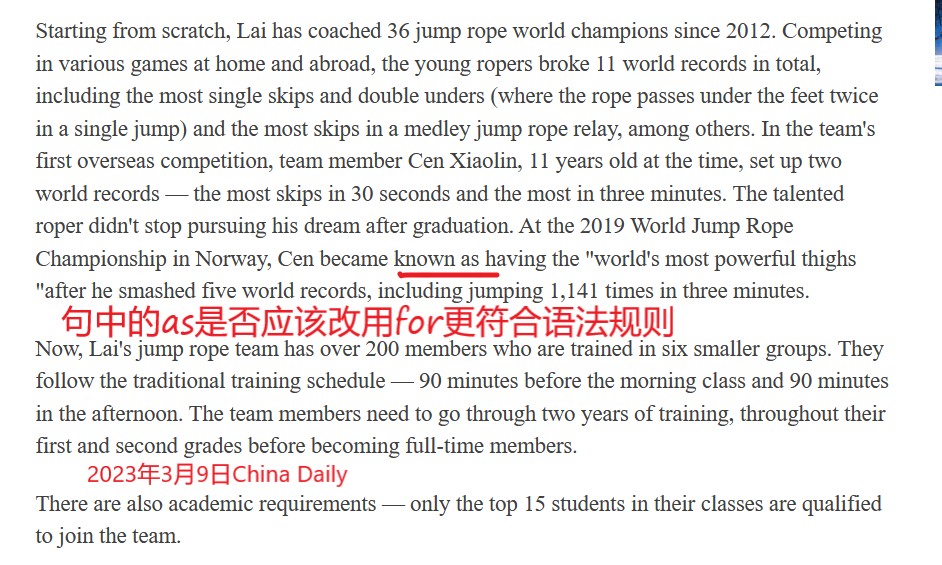

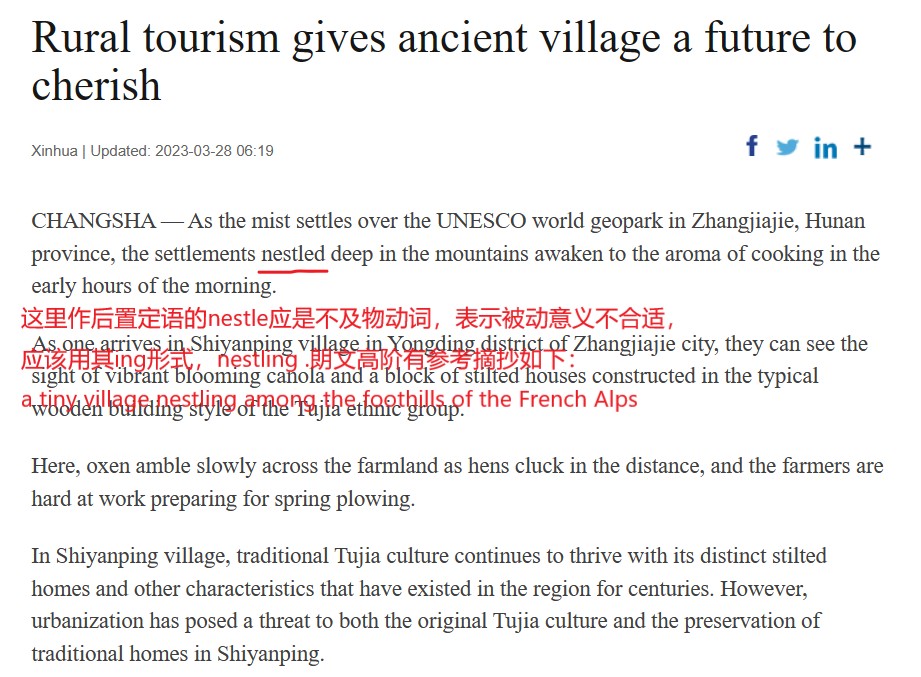
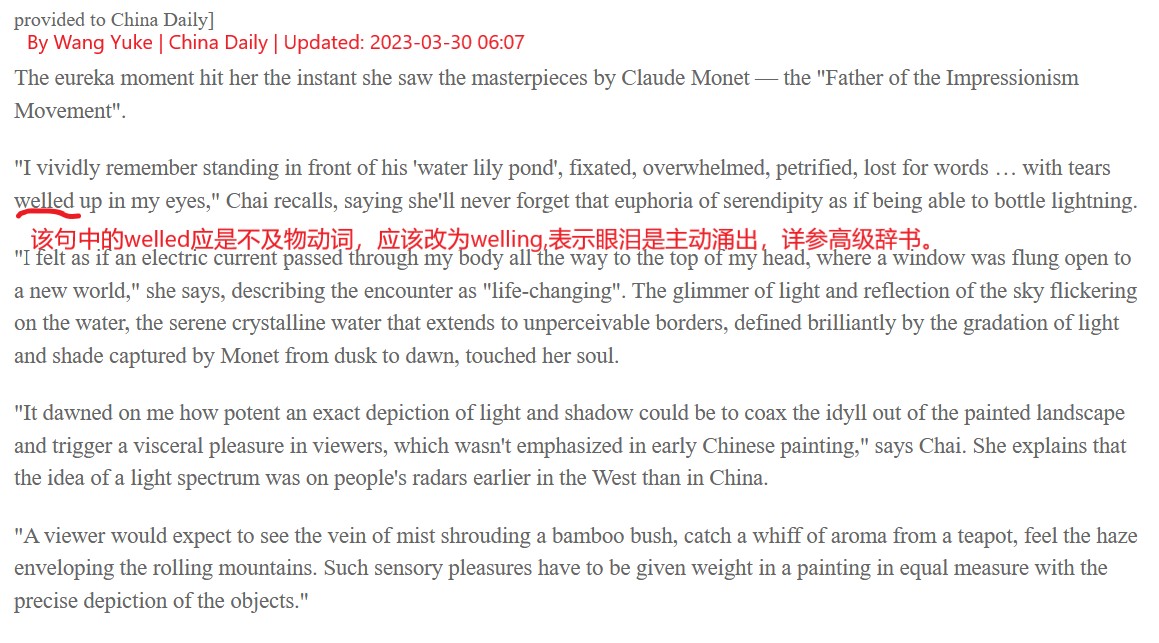
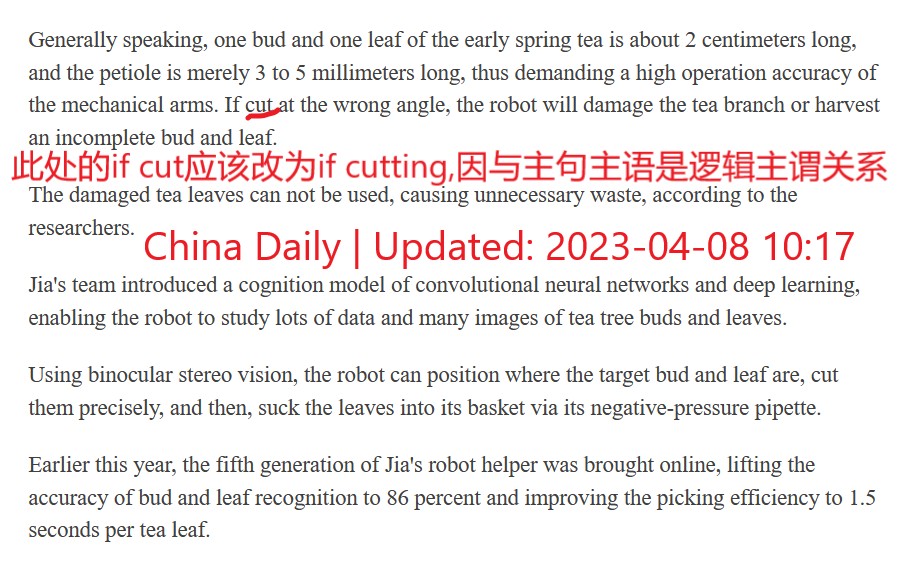
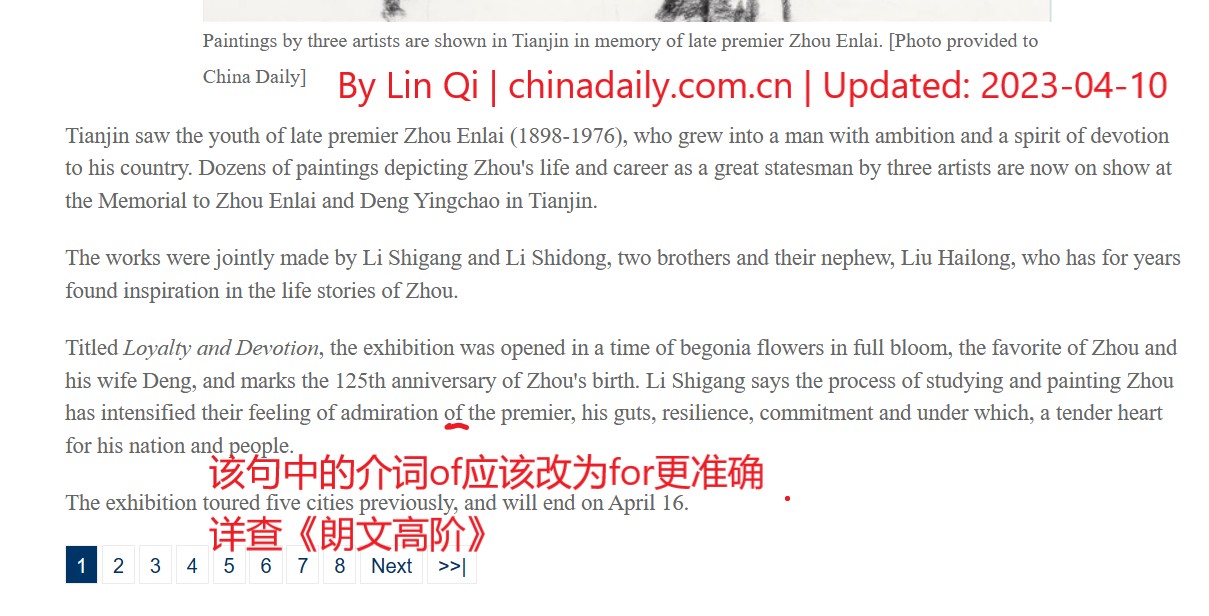

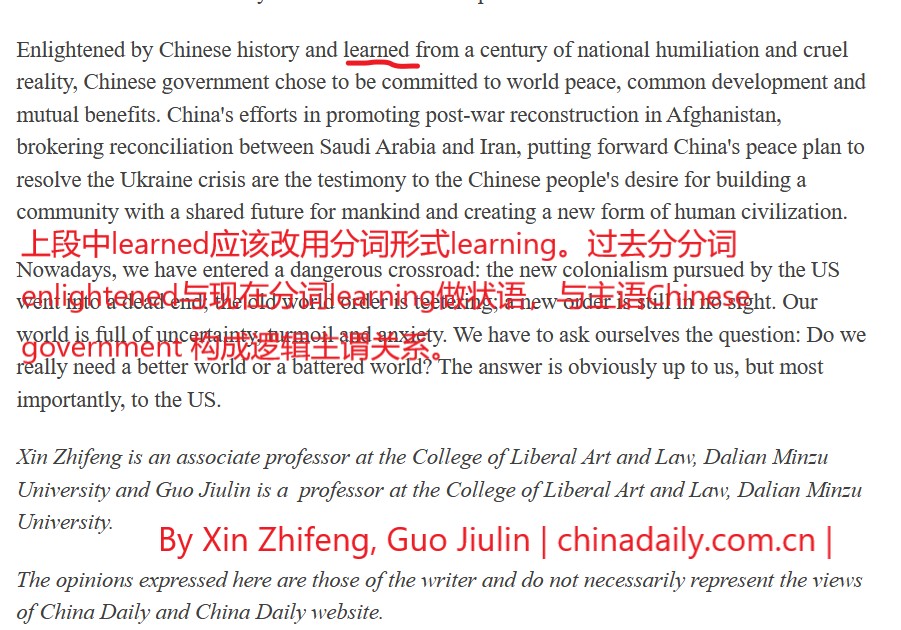
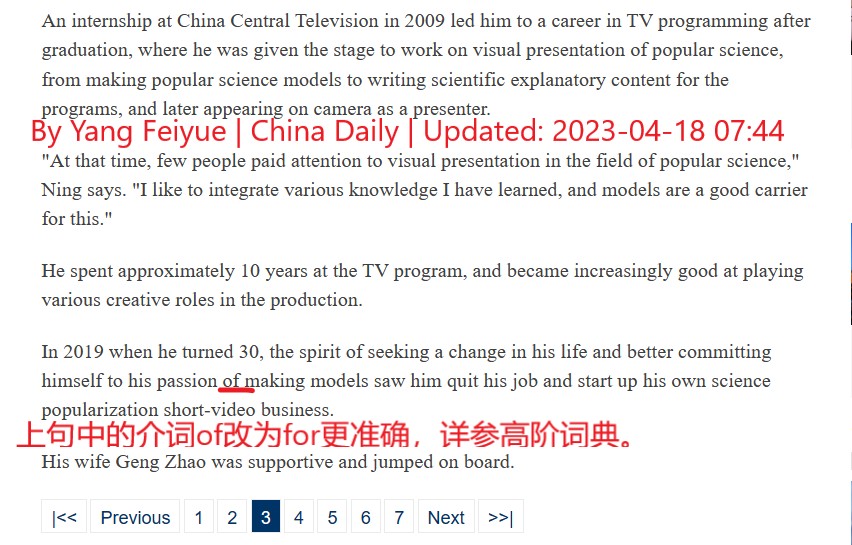
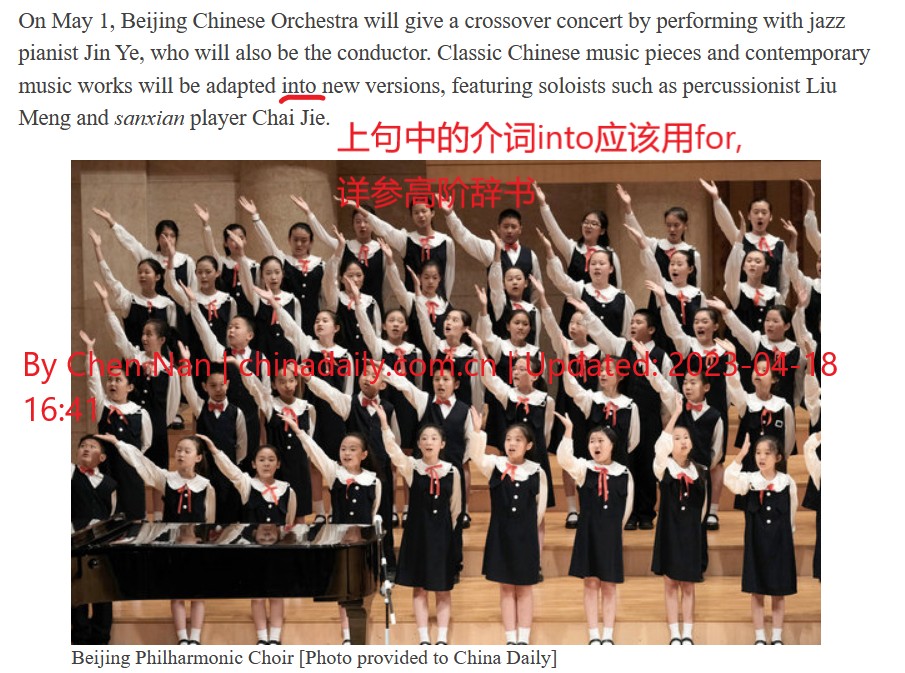




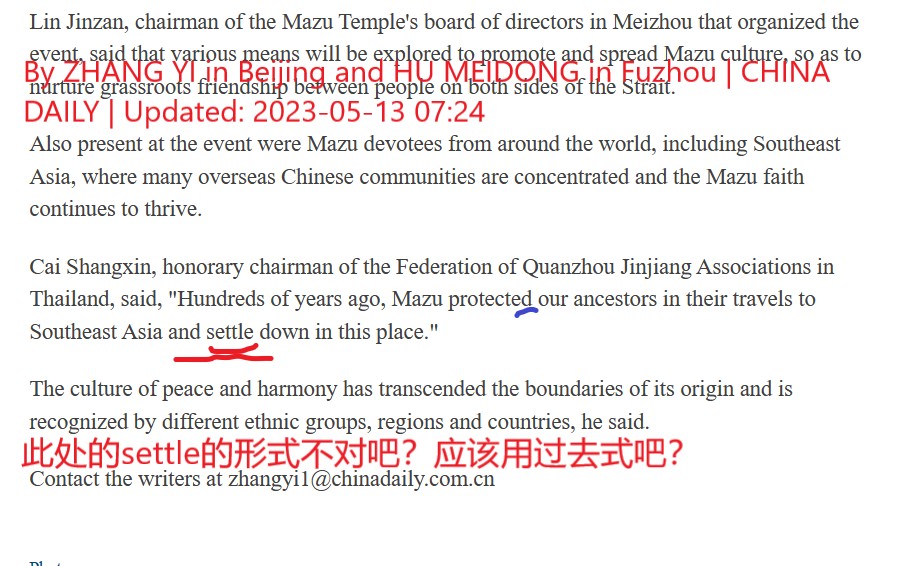
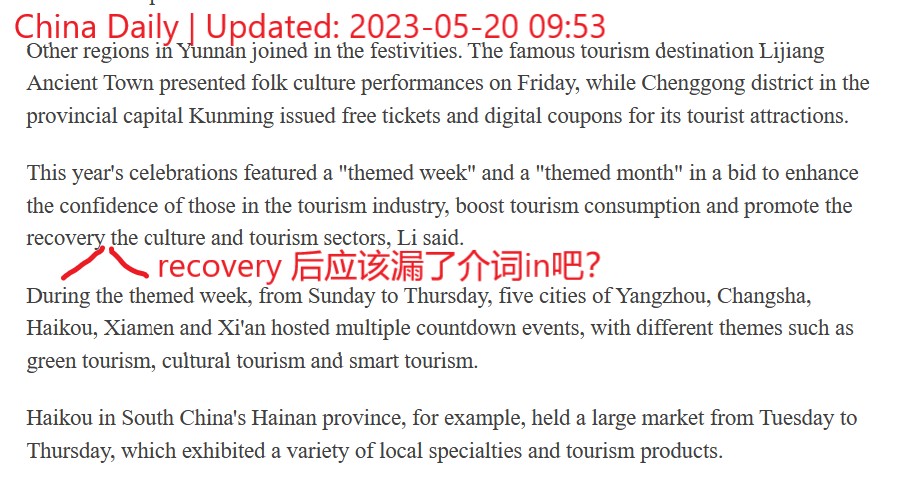
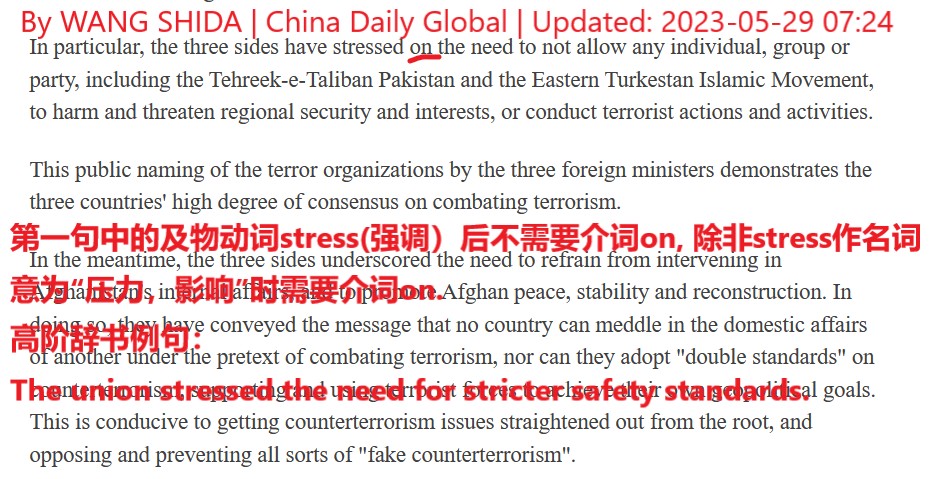
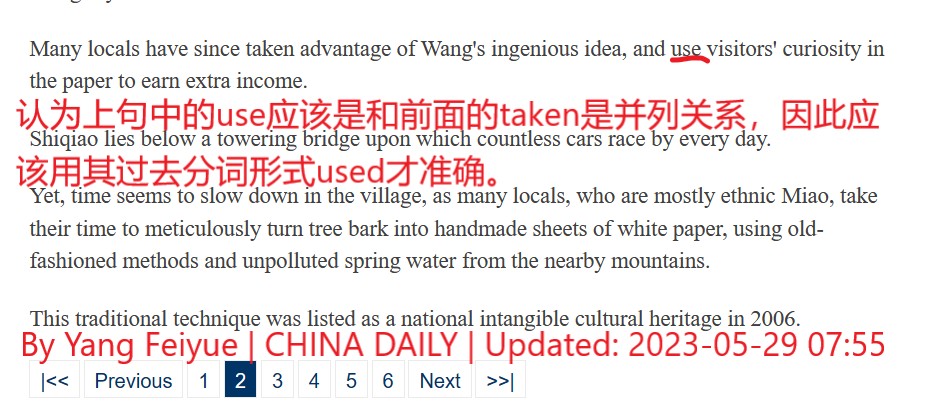
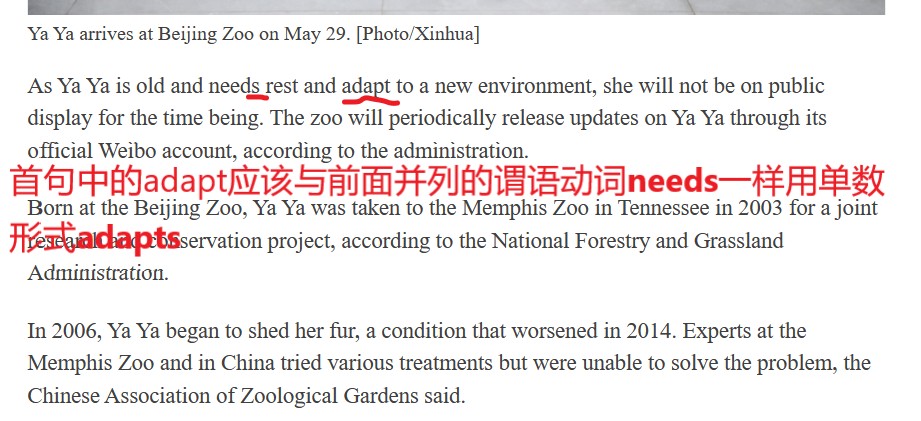




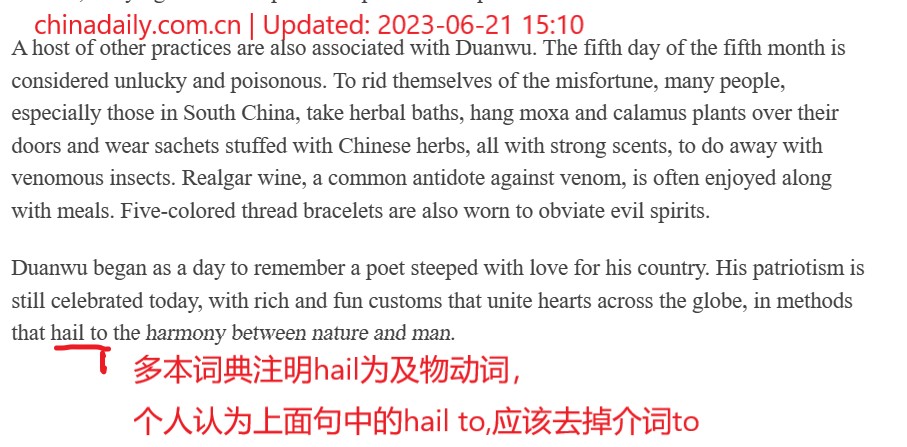

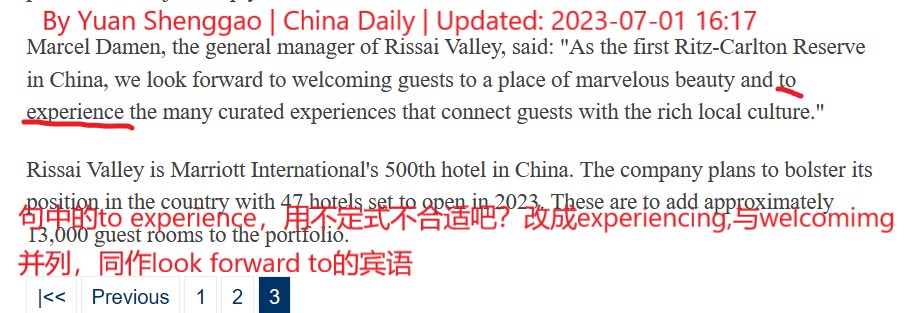


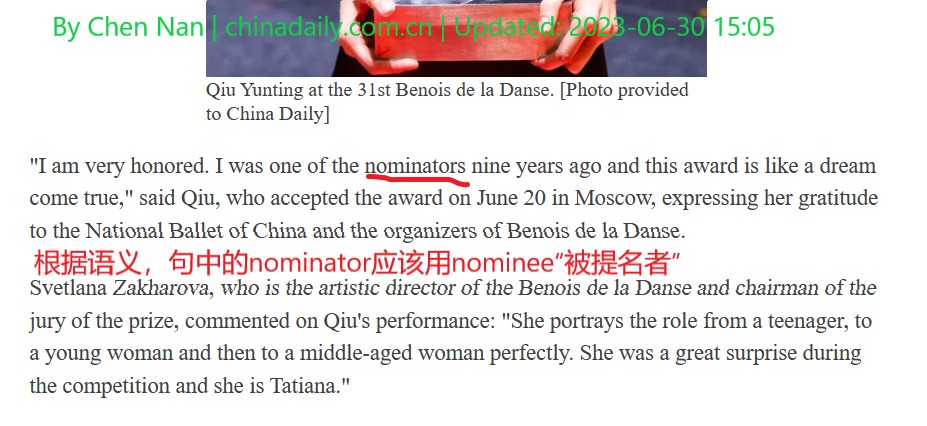

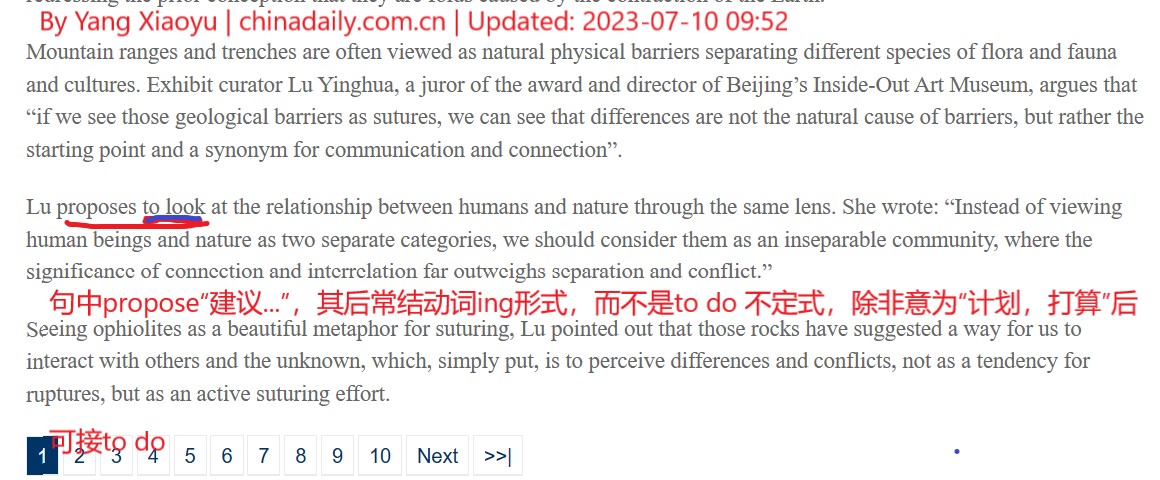


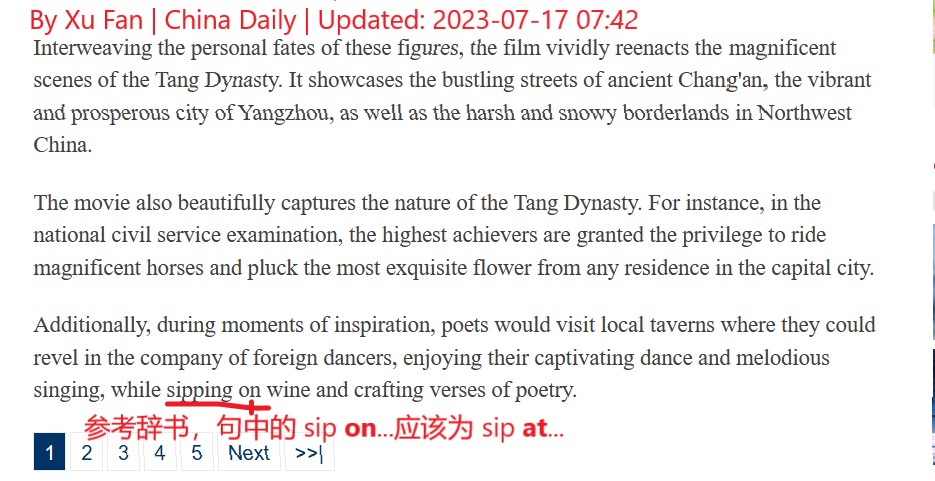
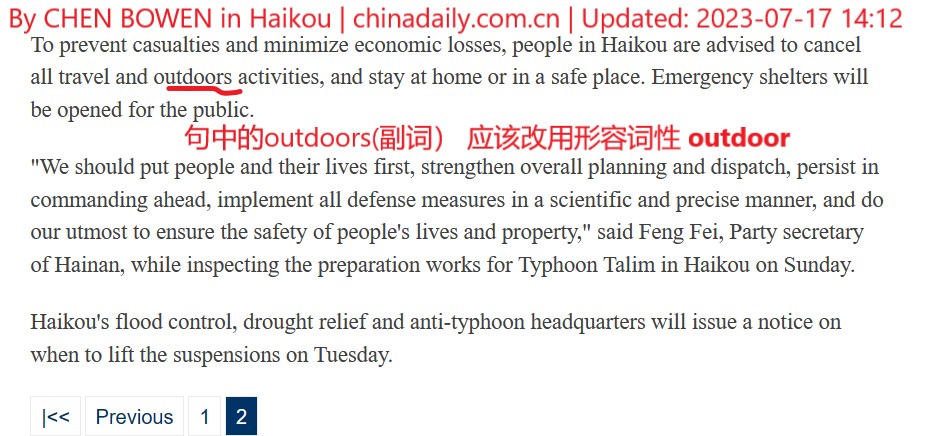


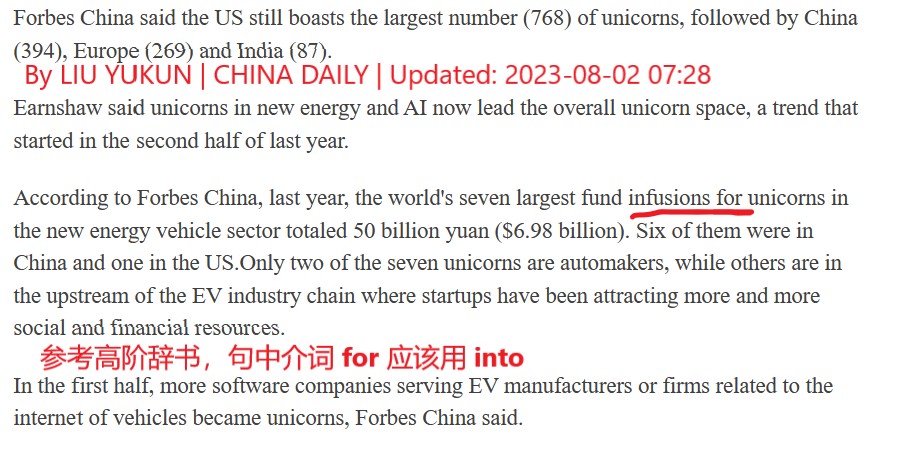




最佳答案 2023-12-26 09:41
网友阅读了大量的文章,也查阅了不少辞书,这样的学习精神让人折服。在激励之下,我也挑战一下自己,尝试做一下探讨。
网友的问题一共有44个,涉及到文章中比较明显的错误(拼写、漏词等)、动词的及物性、介词的用法等,这些可能正是我们平时需要注意的地方。
有一点需要说明一下,原文中有错误,但有时不一定能一改了之,需要联系上下文甚至背景,从整体上进行修改——这一点让我联想到中医的整体观。
做出的回答主要基于词典、搜索引擎(包括n-gram对比)以及个人理解,由于水平和精力有限,难以保证正确性,仅供参考。
说明:
1. 箭头→表示最终方案,黑色表示采用原文的方案(5条),蓝色表示采用网友的方案(33条),红色表示采用其他方案(6条)。
2. 信心指数表示本人对答案有多大把握,一定程度上反映了问题可能的争议程度(比较主观),仅供参考。
1. standing exercise / exercises→ exercise不改
信心指数★★★☆☆
standing exercise在文中表示太极拳中的“(站)桩功”(不是站在桩子上,而是站得像桩子),做不可数名词,同义词为standing practice、standing meditation等。
此外也能见到how to practice standing tai chi exercises这种复数的表达 (见https://pll.harvard.edu/course/introduction-tai-chi),可能是讲具体的(一套)动作。
关于standing exercise,凡哥老师的讲解非常精彩,我这里主要是考虑回复的完整性,凑凑数。
2. became known as / for having the world's most powerful thighs→for【介词】
信心指数★★★★☆
be known后面如果是动名词(包括having、being或者其他动词的ing形式),一般用for。相比之下,as的频率很低。
In the early 18th century, Thomas Wedders became known for having the world's longest nose.
Fidel Castro (1926-2016) is best known for being the world's longest ruling leader with a record of 52 years in office.
需要注意的是,这里的known是形容词,与famous意思相近,不同于一些动词(例如regard / describe)+名词+as+分词结构
3. he was all pined away→he quite pined away【动词及物性】
信心指数★★★☆☆
pine不及物动词,删除was,all这时也不合适了,改为quite。
4. nestled / nestling deep in the mountains→nestling【动词及物性】
信心指数★★★☆☆
根据词典上的解释,nestle此时为不及物动词,改成nestling比较稳妥。
不过实际情况是,使用nestled的频率似乎比nestling更高,可能语言是不断变化的吧。
5. with tears welled / welling up in my eyes→welling【动词及物性】
信心指数★★★★☆
well此时为不及物动词,改为welling。
6. If cut / cutting at the wrong angle, the robot will damage the tea branch→cutting【悬垂】
信心指数★★☆☆☆
cut属于悬垂用法了,考虑改成cutting,此时cut为不及物动词,虽然此时使用频率不太高。
7. their feeling of admiration of / for the premier, his guts→for【介词】
信心指数★★★☆☆
词典里也有of接admire对象的例子,for更常用。
... his admiration of a sexually attractive woman(Collins)
8. the app is accessible by / to companies→to【介词】
信心指数★★★★☆
accessible to接使用对象,by一般接交通方式,如by car / road / public transport。
9. enlightened by Chinese history and learned / learning from a century ... the government→learning【动词及物性】
信心指数★★★★☆
learn与the government为逻辑上的主谓关系,用主动形式。
10. his passion of / for making models→for【介词】
信心指数★★★☆☆
for更稳当点,of的频率也不低。
11. acknowledges to spectators→删to【动词及物性/介词】
信心指数★★★★☆
acknowledge及物动词,致谢。
12. churn out贬义?→不改
信心指数★★★☆☆
具体语境下可以只侧重“大量”的意思,不具有贬义。
13. are suggested / advised to follow→advised
信心指数★★★★☆
suggest建议与advise建议所接的结构不同。
14. on how to maintaining / maintain→maintain【明显错误】
信心指数★★★★★
to为不定式符号,后接动词原形。
15. Mazu protected our ancestors in their travels to Southeast Asia and settle / settled down in this place→settlement in this place
信心指数★★★☆☆
原文settle可能是受前面的to影响,说的是先人定居于此(估计不是护航女神妈祖定居某地吧),但to是介词。考虑改为名词settlement,与travels并列。如果是妈祖定居,那就是settled了。
16. promote the recovery the culture and tourism sectors→of【明显错误/介词】
信心指数★★★☆☆
漏掉介词是个明显错误。这里指推动行业复苏,为所属关系,所以用of。
17. stressed on the need→删除on【动词及物性/介词】
信心指数★★★★☆
stress“强调”,及物动词———不过接on很是泛滥啊。
18. many locals have since taken advantage of ..., and use / used→used
信心指数★★★☆☆
used与taken并列更合常理。
19. as Ya Ya is old and needs rest and adapt / adapts to a new environment→needs to rest and adapt
信心指数★★★☆☆
原文有误,这里表示需要休息和适应(“适应”也是需要的内容),所以改为needs后加不定式,动词rest(原文中看起来是名词)和adapt实现并列。
20. who leaned / learned smoking→learned【明显错误】
信心指数★★★★★
打字时很容易漏个字母,如果错误的单词成了另一个单词,就更不容易发现——要是使用改错软件跑一下,一般也能发现出来。
21. a rose planation / plantation→ plantation【明显错误】
信心指数★★★★★
plantation种植园,原文漏字母。
22. by 0.9 year / years→years
信心指数★★★★☆
小数接名词,一般用名词复数,尤其是末位数不是1的时候。
23. the room is often booked out / up→up
信心指数★★★☆☆
book up预订一空
24. that hail to the harmony→删除to【动词及物性】
信心指数★★★★☆
hail此时为及物动词。
25. grateful for / to those who→to【介词】
信心指数★★★★☆
后接人,用to为好。
26. we look forward to welcoming guests to a place of marvelous beauty and to experience / experiencing the many curated experiences → 删除experience
信心指数★★★★☆
如果改为experiencing,形式上与welcoming一致,做look forward to的宾语,但此时语义成了“我们”体验,这不符合“让游客体验”的语境。考虑删除experience,这样to the many curated experiences与to a place of marvelous beauty并列,构成welcoming guests to the many curated experiences的结构。
27. my hometown is abound / abounds with wine→abounds
信心指数★★★★★
abound为动词,abundant为形容词,可以用abounds with / abounds in / is abundant in。
28. it is again welcoming travelers to immerse→不改
信心指数★★★☆☆
welcome somebody to do something词典上出现得少,但柯林斯词典上有相关例句:We welcome you to join us on a special tour which explores this unique Australian attraction.(网站上刘老师也有讲解)。如果改的话,考虑改为to the immersive experience in...
29. one of the nominators / nominees nine years ago→ guest artists
信心指数★★★☆☆
nominators提名者,nominees被提名者,nominees明显更合适。只是感觉九年前就是被提名者有些怪,查看中文资料发现是“九年前我第一次以参加展演的表演者的身份站在莫斯科大剧院的舞台上,今天又是以被提名舞者的身份重新回到这个舞台上”,这两次的身份是不同的,这次是nominee(s),九年前是参加展演的表演者(那时年纪还小),所以可能更适合翻译为guest artist(s)。
30. a key witness of / to the western expansion→to【介词】
信心指数★★★☆☆
……的见证人,介词用to。
31. Lu proposes to look / looking at → looking
信心指数★★★☆☆
根据词典上的解释,propose表示建议,非打算,此时用looking稳妥一些——实际使用to do的频率又确实很高。
32. these libraries are very keen in / on participating→on【介词】
信心指数★★★☆☆
be keen on doing something。
33. the group is focusing its strengths in / on the gasoline market and intensifying its efforts→on【介词】
信心指数★★☆☆☆
focus ... on结构。不过focus its strengths on the gasoline market这个表达本身感觉挺别扭。
34. while sipping on / at wine→on / at都可以,所以不用改【介词】
信心指数★★★★☆
sip on something / sip at something的意思都是to take small sips of a drink over a period of time.,sipping on wine的频率更高。
35. all travel and outdoors / outdoor activities→outdoor
信心指数★★★☆☆
Webster上outdoors有形容词义项,不过稳妥起见,还是用outdoor。
36. but also to extends to→删除第一个to【明显错误】
信心指数★★★★★
to后面不可能接单三,属于明显错误。
37. government craw / crack down on → cracks【明显错误】
信心指数★★★★★
明显的拼写错误,感觉平时扫描时容易出现这种问题。政府做主语,谓语可单可复,这里暂时采用了单数谓语。
38. fund infusions for / into unicorns in the new energy→into【介词】
信心指数★★★☆☆
for的频率也比较高,可能更强调目的。
39. several commonalities among / between the three → between【介词】
信心指数★★★☆☆
between频率高一些,among也可以,见The Britannica Dictionary例句:
commonalities among the various religions [=features or qualities that the religions have in common]
40 people's curiosity for / about nature→about【介词】
信心指数★★★★☆
curiosity about something为词典上所列用法,更为常见。
41. with some destinations anticipated to experience / experiencing high visitor numbers→anticipating high visitor numbers
信心指数★★★☆☆
anticipate (somebody/something) doing中的doing是个动名词,如果有逻辑主语,就构成动名词的复合结构,但动名词的复合结构不太会将逻辑主语拿出来构成被动语态。而anticipate接不定式的宾补词典上并没有相关用法。谨慎起见,将anticipate改为现在分词,后面接something。
42. since the ... announcement of ... regions approved for / of resuming group tours→不改【介词】
信心指数★★★★☆
这里不是approve of短语,approve这里是及物动词,表示批准,过去分词短语做后置定语,for表示方面/目的。这里的用法与如下牛津上的词条类似,只是牛津上是for something。
be approved for something: This medicine is not approved for use in children.
43. the Asia-Pacific region is also where we put great focus on →去掉on【介词】
信心指数★★★★☆
where为关系副词。
44. landmark water project completes / completed ahead of schedule→completed【及物性】
信心指数★★★★☆
complete为及物动词。
如果觉得我的回答对您有用,请随意打赏。你的支持将鼓励我继续创作!

其它 1 个回答
我一直提倡学生养成勤查英英字典的习惯,quanfa网友虽然问题较多,又无序号,但匆匆浏览一遍,发现quanfa网友下足了功夫,查阅了很多词典,提出了自己具体的看法,而非简单抛出问题,拿个答案。这种学习方式如能坚持/保持下去,英文想不进步都很难。
我开个回复贴,贴出自己的意见供网友参考。奈何网友问题数量实在太多,密密麻麻看得头晕脑花,我只能每次得空的时候,就尝试解答一二,然后以评论的方式慢慢回复完毕。每次的回复我都会先列出关键词,代替问题序号,方便大家共同探讨。因为评论贴没有格式,问题讲解有时候需“长篇大论”,为了最大程度的降低阅读“难度”,如有追问或探讨,请在quanfan网友的提问贴下以评论的方式提出(带上关键词),避免直接评论,打乱了评论顺序。
【standing exercise】
在此处,它不是指普通的站立运动,或者是某种具体的站立运动,而是指太极拳中的“站桩”,属于“桩功”的一种,可见,某种意义上,它是属于“专有名词”了,做不可数名词用。如同朗文字典对exercise的解释:physical activities that you do in order to stay healthy and become stronger,此时为不可数名词。在这个基础上加上standing,只是为了命名“站桩”这个英文中没有的概念,其内容和含义仍然从属于“physical activities that you do in order to ...”不变,就好像我一个人参加party,不能因为我多穿了一件衣服,就变成多个人参加party。“桩功”在英文中还有一种表达,pile work。此处work也是取activity之意,也是不可数名词( when you use physical or mental effort in order to achieve something),加了pile后,专门指中国功夫的“桩功”,仍然做不可数名词用,道理一样。
要注意的是,老外、洋弟子等,对于中国功夫,中国某门某派的武功,有时候和国人的理解、中国功夫大师的理解不太一样,这会在他们的英译中提现出来,甚至不同的洋人对于同一门中国功夫,理解也可能不同,从而导致各自的英文表述不同。这是没有办法的事,如果我们照搬语法的条条框框的话,只会徒生烦恼洋人之多,最好的方法是试着从对方对语法规则的运用去了解对方的真实意图。
【know as vs know for】
此处改为for虽然没问题,但是用as更精准。虽然当我们“think that someone has particular qualities”,know somebody as something 和 know somebody for something 两个短语都可以用,但二者之间是有细微区别的:
在someone has particular qualities 的基础上,如果你用具体的name来指代这种quality,就用know somebody as sth (sth= a kind of names)。原文用双引号指出了这个name--“world's most powerful thighs”。
二者的细微区别其实从字典的例句也可以看出来(尽管字典将二者放入同一条目下):
know somebody as something
I knew him as a hard-working, modest, and honest politician. (kind of names)
know somebody for something
In fact, I knew her for a tough-minded young woman.
如果体会不到这种细微区别,那就继续查,直接看字典释义吧:
know somebody/something as something:to have a particular name
The main street between the castle and the palace is known as ‘the Royal Mile’.
Nitrous oxide is commonly known as laughing gas.
【未完待续】
一家之言,仅供参考;
勤查英英,必有所获!
- 2 关注
- 1 收藏,1542 浏览
- quanfa 提出于 2023-09-15 16:40
相似问题
-
 《高考英语备考1号·速效编》
《高考英语备考1号·速效编》
-
 《高考英语备考1号·写作编》
《高考英语备考1号·写作编》
-
 《高中英语晨读晚记》
《高中英语晨读晚记》
-
 《高中英语错题笔记》
《高中英语错题笔记》
-
 《零起点考大学英语》
《零起点考大学英语》
-

